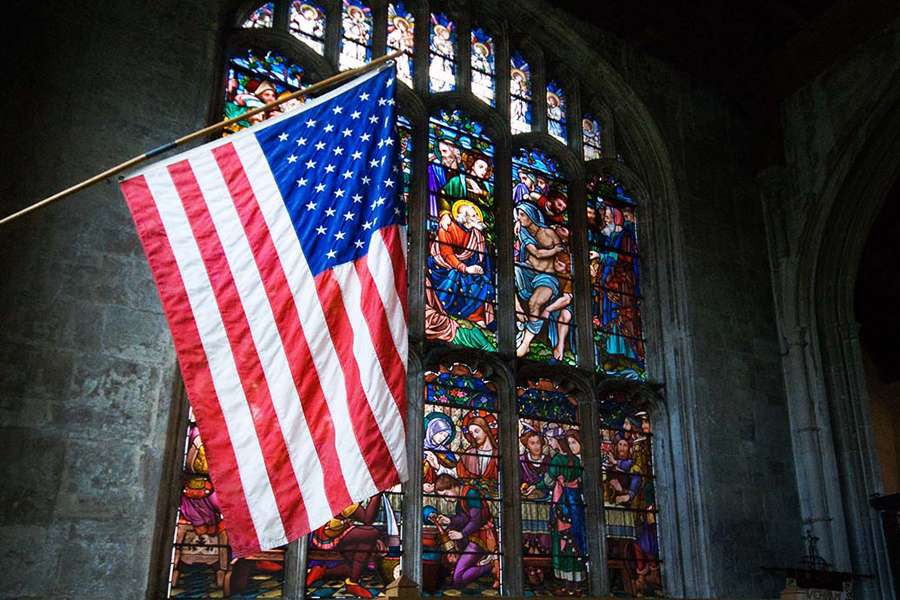New York City, N.Y., Jul 14, 2017 / 05:00 pm (CNA/EWTN News).- A federal court ruled Friday that the Archdiocese of New York had the right not to hire a diocesan school principal in a First Amendment religious freedom decision. “The court saw right through this blatantly anti-Catholic lawsuit, agreeing with the Supreme Court that the church, not the state, should pick religious leaders,” Eric Rassbach, deputy general counsel at Becket, which represented the archdiocese in court, stated July 14 in reaction to the decision.
The case before the U.S. Second Circuit Court of Appeals involved St. Anthony’s school in Nanuet, N.Y., 35 miles north of New York City. The school had decided in 2011 not to renew the contract of its then-principal Joanne Fratello because of her alleged “insubordination” shown to the pastor of St. Anthony’s parish.
Fratello later alleged that the contract decision was a case of sex-based discrimination, and she filed a lawsuit against the school and the archdiocese. She said that she had been hired in a lay capacity, and thus the archdiocese would not be exempt from a discrimination lawsuit under the “ministerial exception.” The “ministerial exception” forbids the government from intervening in the employment of a minister by a church, as part of the Establishment Clause of the First Amendment. The exception was upheld in 2012 in the Supreme Court’s Hosanna-Tabor decision, which clarified that the Hosanna-Tabor Evangelical Lutheran Church and School’s decision to fire a teacher who had the title of “minister” and who worked in a ministerial capacity could not merit an employment discrimination claim.
Regarding Fratello’s claim, the archdiocese argued in court that she had indeed been hired on a ministerial basis and that their decision not to renew her contract was protected under the ministerial exemption. Becket clarified that Fratello was given a “lay” contract for her job as a principal not because her job was a secular position, but because she was not a religious who had taken a vow of poverty. A diocesan priest would have received a similar contract for the job, Rassbach explained.
On Friday, two judges for the Second Circuit and one district court judge upheld a district court decision that favored the archdiocese. “We conclude that the plaintiff's claims are barred because she is a minister within the meaning of the exception,” the opinion said. “Although her formal title was not inherently religious, the record reflects that, as part of her job responsibilities, she held herself out as a spiritual leader of the school and performed many religious functions to advance its religious mission.”
Judges cannot ultimately determine whether ministerial cases constitute true discrimination, the opinion stated. “Judges are not well positioned to determine whether ministerial employment decisions rest on practical and secular considerations or fundamentally different ones that may lead to results that, though perhaps difficult for a person not intimately familiar with the religion to understand, are perfectly sensible — and perhaps even necessary — in the eyes of the faithful,” the opinion said. “In the Abrahamic religious traditions, for instance, a stammering Moses was chosen to lead the people, and a scrawny David to slay a giant.”
The Hosanna-Tabor case presented several standards to determine one’s ministerial capacity, the judges said, including the “formal title” of their job, the use of that title by both the subject and employer, and the “religious functions” of the job. Fratello met these conditions as a minister, they wrote, as she performed a myriad of religious duties as a principal and had even touted her own “strong Catholic faith” when she applied for the position.
Her religious duties included organizing and leading public prayer over the school loudspeaker, helping plan school Masses and religious assemblies, and encouraging students to attend Mass and grow in their spiritual lives. In her evaluation by the parish pastor at the end of her first term as principal, Fratello was reviewed on her ability to establish a “Christian atmosphere” at the school, how well she had fostered a “comprehensive religious education program,” and whether she had promoted “a strong program of evangelization.”
According to the archdiocese’s administrative manual for the archdiocesan schools, a cover letter written by the late Cardinal Edward Egan of New York stated that the school principals had “accepted the vocation and challenge of leadership in Catholic education.”
In conclusion, the judges stated that “although Fratello's formal title was not inherently religious, the record makes clear that she held herself out as a spiritual leader of the School and performed many important religious functions to advance its Roman Catholic mission.” “The ministerial exception thus bars her employment discrimination claims because she was a minister within the meaning of the exception,” they said.
Fratello’s lawyer had drawn controversy for a scathing reply he had authored in response to an amicus brief filed on behalf of the archdiocese by the Orthodox Church of America. He wrote that “organized religion” is a threat to “enlightened rationality,” and called the Roman Catholic Church “the most powerful church on earth.”
The American founders, he said, were “people of the Age of Enlightenment” and believed that “that organized religion and religious dogma are dangerous to a society, and what a society needs is enlightened rationality.” He said that “our American democracy” could be “undermined if religious groups religious groups can propagandize and indoctrinate school children without the constraint of a loyal American citizen and educator (e.g., a lay school teacher or principal) insisting that secular curriculum be properly taught.”

